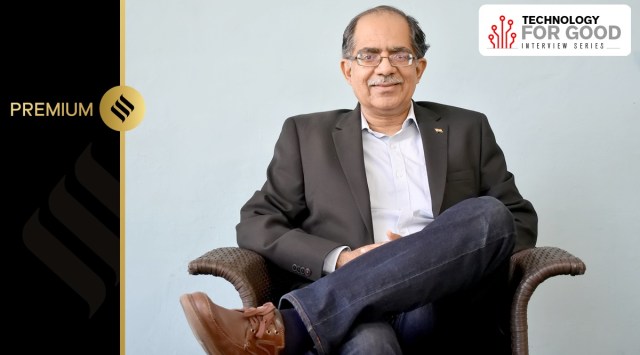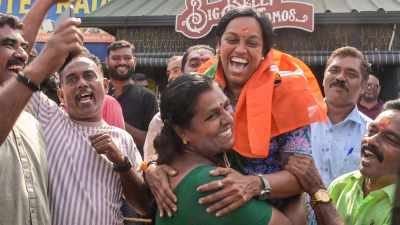We are playing the global tech game in the Bharat playground: Sharad Sharma, co-founder, iSPIRT
Sharad Sharma speaks to indianexpress.com on iSPIRT’s decade-long journey and the challenges of building DPI (Digital Public Infrastructure) for India and the world
 Sharad Sharma, who calls himself an ‘Orbit Change Catalyst’, finds parallels between iSPIRT and the Lunar Men who lived in Birmingham in the 1860s. (Express photo by Jithendra M)
Sharad Sharma, who calls himself an ‘Orbit Change Catalyst’, finds parallels between iSPIRT and the Lunar Men who lived in Birmingham in the 1860s. (Express photo by Jithendra M)
Sharad Sharma believes in solving problems of scale. He co-founded iSPIRT Foundation, a volunteer-driven technology think tank set up in 2013, that has played a key role in building India Stack, which includes UPI, Digilocker, eKYC and eSign.
Sharma, who calls himself an ‘Orbit Change Catalyst’, finds parallels between iSPIRT and the Lunar Men who lived in Birmingham in the 1860s. Led by Erasmus Darwin, these freethinkers passionately debated the issues of the day and looked for technological solutions to hard societal problems. They made ground-breaking inventions — such as the steam engine — which changed the world.
iSPIRT’s goal is equally revolutionary — to use the power of the software to restructure India’s economy and improve the life of an ordinary citizen.
Sharma spoke to indianexpress.com on iSPIRT’s decade-long journey and the challenges of building DPI (Digital Public Infrastructure) for India and the world. Excerpts:
Venkatesh Kannaiah: As an ecosystem builder, what is your focus now?
Sharad Sharma: Ten years ago, we started working on two deficits in India — an innovation deficit and a jobs deficit. The country has decided that it will solve the innovation deficit through startups. India Stack enables those startups to serve the middle India, also called Bharat. India Stack also enables MSMEs to get cashflow credit so that they can grow their business and create jobs at scale.
Our dream is bigger. We excel in providing services as a nation but don’t have a product industry. iSPIRT’s mission is to address this in the coming years.
Venkatesh Kannaiah: What lessons can we learn from the success of Aadhaar and India Stack?
Sharad Sharma: We need a new class of institutions to conceive, promote, and manage an ecosystem. In the case of Aadhaar and ABDM (i.e. Health Stack) this is done by UIDAI and NHA (National Health Authority). They are government institutions. In the case of payments (NPCI) and commerce (ONDC), these are semi-government non-profit institutions. Account Aggregator has a different model. Here, Sahamati, a non-government, non-profit institution, plays that role. Each of these approaches has its pros and cons. We have not yet found the right structure that would drive the next set of DPIs as we go forward.

Venkatesh Kannaiah: How many volunteers does iSPIRT have and how are they selected?
Sharad Sharma: We try to cap our active volunteers to 150. We rely on a social compact to enforce our underlying philosophy of ‘no greed, no glory’. This limits us to the Dunbar’s number, which is around 150. We often joke that we have a volunteer for every crore Indians. You can find out more about how to become a volunteer at https://volunteers.ispirt.in/.
Venkatesh Kannaiah: We hear about ‘consent based data sharing system’ . Do you think citizens are ready and mature enough to navigate this?
Sharad Sharma: Indians have very high native intelligence. We are informed voters, much to the surprise of many. For informed consent, we must have similar faith in our citizens.
Our Data Empowerment and Protection Architecture (DEPA) and DPDP (Digital Personal Data Protection) Act provide purpose-limited consent for sharing that is granular, revocable, and auditable. Carefully designed techno-legal systems like this work at scale.
 Sharad Sharma co-founded iSPIRT Foundation, a volunteer-driven technology think tank set up in 2013, that has played a key role in building India Stack. (Express photo by Jithendra M)
Sharad Sharma co-founded iSPIRT Foundation, a volunteer-driven technology think tank set up in 2013, that has played a key role in building India Stack. (Express photo by Jithendra M)
India is the first country to implement this kind of techno-legal approach. This is better than the data regime in the US and Europe. The US has very few protections for its citizens. The EU has better legal protections, but they are hard to enforce and have been misused in the last few years.
Venkatesh Kannaiah: How is the ‘kisan drone’ project doing?
Sharad Sharma: Kisan Drone is a Challenge Grant that seeks to resolve the issue of crop insurance for small farmers. It uses NavIC, cutting-edge sensing and AI-based damage assessment. The Ministry of Commerce drives this Challenge Grant with ISRO/SAC and the Agriculture Ministry. The Challenge Grant is off to a great start. Over 250 startups got involved. Soon, seven startups will be selected. Field deployment will take a year or so, and winning startups will be selected based on their actual performance.
Challenge Grants are a new concept for this. They galvanize the startup ecosystem to solve a societal problem. This has worked recently with TB (Tuberculosis). The Challenge Grant successfully helped us accelerate our TB mission by 4 years.
Venkatesh Kannaiah: Tell us about Open Credit Enablement Network (OCEN) and how it will benefit MSMEs.
Sharad Sharma: OCEN is an effort by policymakers, market players, and iSPIRT to address collateral-free short-tenor cash flow lending to MSMEs. It serves 85% of India’s small and medium enterprises not eligible for annual working capital loans.
OCEN emerged from the UK Sinha Committee on MSMEs. It brings many stakeholders together. It reduces the cost of acquiring a borrower. It also brings down the cost of processing, disbursing, and collecting a loan. Real-time reporting brings down regulatory costs. New underwriting models reduce delinquency. The introduction of Borrower’s Agents provides scalability to lenders.
We have conducted three pilots over the last two years, and the learnings have been incorporated into the OCEN 4.0 version. We believe this will be a game-changer for MSMEs.
Venkatesh Kannaiah: Open Network for Digital Commerce. Your thoughts on whether the offtake is slower than you expected?
Sharad Sharma: There are three types of Open Networks being built in India. ONDC is about selection, which is what matters in e-commerce. OCEN is about collection, as this is crucial for unsecured lending. OHSN (Open Health Services Network) is about connection. A typical family will have about 10 doctor visits in three years. Having that family find a good doctor that they can go back to again and again is good for public health. All these Open Networks are very different from each other.
The competitive environments are also different. ONDC takes on the incumbents, while OCEN and OHSN address a white space. It will take 12-18 months to know whether they are solving the problems they have set out to solve.
Venkatesh Kannaiah: Are you happy with the impact of iSPIRT? Has it lived up to its expectations?
Sharad Sharma: We have come a long way in 10 years. Today, India Stack and DPI are important to India and the rest of the world. This is an excellent start to the journey of becoming a Product Nation. But we still have miles to go to turn our mission into reality.







